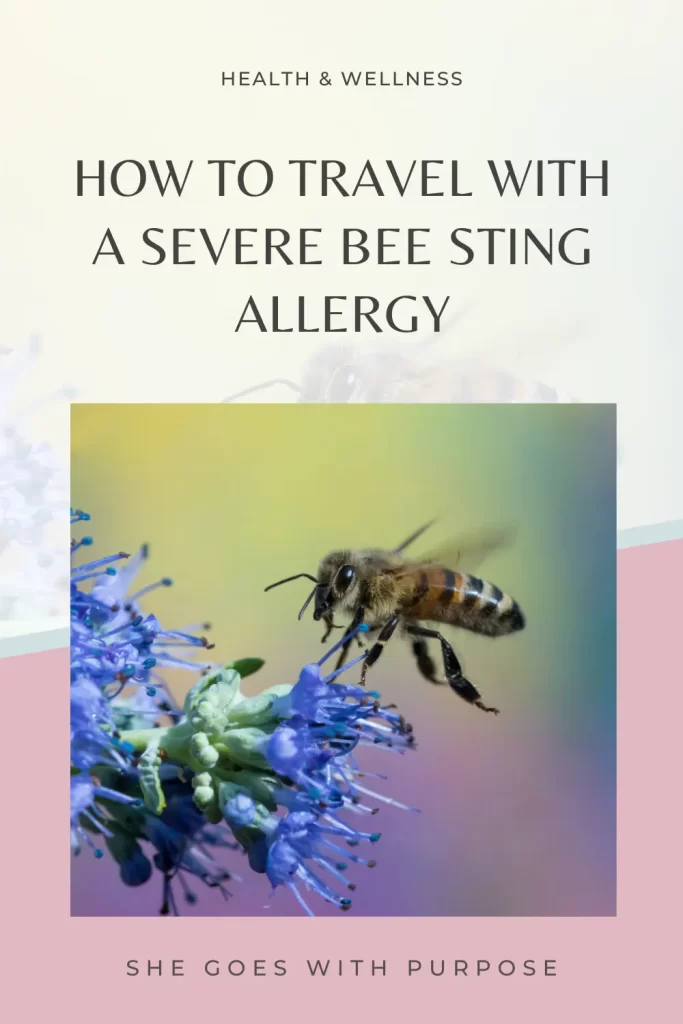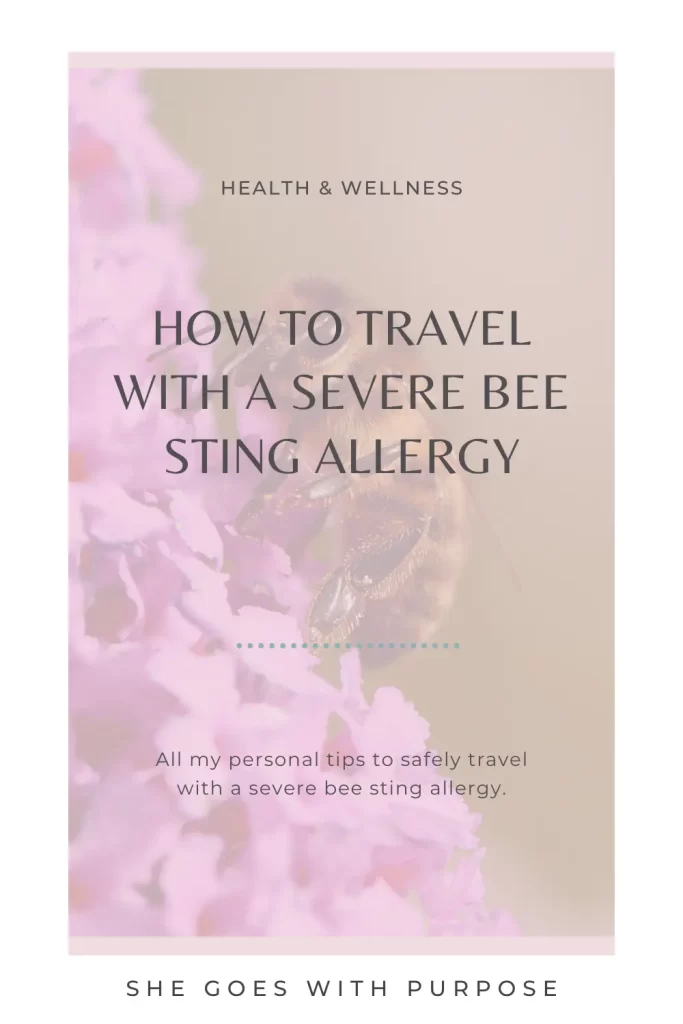How to Travel with a Severe Bee Sting Allergy
The last thing I want to experience while traveling is allergies. All the typical things can set me off – dust, pollen, grass. I also have a number of food allergies, too. So, I take several daily antihistamines to help avoid a stuffy nose, cough, congestion, and stomach aches.
Unfortunately, I also have a severe bee sting allergy. I would experience a lot worse than the common allergy symptoms if I was stung. I could have a potentially fatal reaction called anaphylaxis (pronounced “an-a-fi-lax-is”).
There is no preventative medication available for this allergy as there is for my other allergies. The only way to avoid anaphylaxis is to not get stung. But that’s difficult when you love to stop and smell the roses!
However, I’m happy to say I’ve successfully evaded bee stings for over three decades! All while spending loads of time outdoors for work and fun both at home and when I travel.
I’ve compiled all my personal tips to safely travel with a severe bee sting allergy.
THIS IS NOT MEDICAL ADVICE
Do not take my advice as professional medical advice because I am not a doctor. This is simply what works for me.
If you’ve ever had a reaction to a bee sting, talk to your doctor about getting an EpiPen prescription. There are side effects and other reactions if used while taking certain medications, which could make this an unsuitable option for some people.
Know the Symptoms of Anaphylaxis
Not every bee sting will warrant the use of an EpiPen. Knowing all the symptoms of anaphylaxis will help you determine the severity of your situation.
Common symptoms of anaphylaxis are the appearance of hives, itching, and swelling of the affected area, and other parts of the body including the face and mouth. These symptoms alone may only require the use of Benadryl and a doctor’s visit.
More severe symptoms include tightening of the chest and throat, and difficulty breathing. Chest pain, low blood pressure, dizziness, and headaches are symptoms of anaphylaxis as well. If you experience any of these symptoms, you may need to use your EpiPen.
Immediate medical attention is necessary with the use of auto-injectors. Call 911 (or the local emergency number if you’re overseas) or get to an emergency room as soon as possible.

What to Pack for a Severe Bee Sting Allergy
I always carry an epinephrine auto-injector (available by prescription only) and Benadryl. These two things are the first step to safely travel with a severe bee sting allergy.
If I do get stung, I’ll be able to take immediate action against anaphylaxis. These two medications will subdue the reaction until I can get medical attention.
An epinephrine auto-injector contains the medication epinephrine, a synthetic version of adrenaline. I have always personally carried an EpiPen brand auto-injector, but there are other brands of auto-injectors. EpiPen (the brand) and epinephrine auto-injector are often used interchangeably.
Benadryl is an antihistamine and helps with the swelling and itching. So, a fast-acting liqui-gel will work fast and is more portable than a bottle of liquid.
I haven’t been stung in decades, but that didn’t matter to my doctor. He wrote a prescription for an EpiPen at my first utterings of the dramatic reaction I had to a double bee sting at 4 years old. They got me on the forehead and left me “looking like Frankenstein,” as the story goes.

You Must Know How Your Auto-Injector Works
The epinephrine, or adrenaline, helps to constrict blood vessels and relax muscles in the lungs. This increases blood pressure and improves breathing for someone experiencing anaphylaxis. For EpiPen users, the medication is only released once the orange tip is pressed against the outer thigh.
If a practice unit is not given with your prescription, ask your doctor to show you how they work.

Tips for Going Through Airline Security with EpiPens
I was nervous about going through security the first time I flew to another country while carrying my EpiPen. Before I did some research, I was afraid that it would be considered a weapon and be confiscated. That’s very much far from the truth.
I have gone through security with my EpiPens several times in multiple countries and nothing alarming has happened. When I’ve disclosed to security that I am carrying EpiPens, they have waved me off saying, “It’s ok,” or asked to put them on a separate tray from my other belongings. Also, I have traveled with EpiPens both with and without prescription labels without hassle either way.
The effects of X-rays on the medication are unknown. So you may ask a security agent to visually inspect your EpiPens instead. If you do this, keep your EpiPens somewhere with easy access, like in your purse or computer bag.
10 Additional Tips for Traveling with a Bee Sting Allergy
- Keep a vigilant eye out for bees, especially while outdoors, near flowers, grilling meat, or eating food outside.
- Always wear shoes when outdoors. Even a pair of flip-flops in the grass acts as a protective layer between you and a bee’s stinger.
- This goes without saying, but don’t aggravate the bees. Steer clear of nests, don’t swat at them, etc. Just leave them be and they’ll return the favor.
- Always carry two EpiPens while traveling.
- Learn to say “I’m allergic to bee stings” in the language of the countries you will be traveling in.
- Request extra prescription labels at the pharmacy and attach them to the hard plastic carrying cases of your EpiPens. It’s not a requirement, just a precaution.
- Tell your travel companions that you carry an EpiPen and how they can help you if you need to use it.
- While traveling overseas, memorize or save the local emergency phone number on your phone. Ask the front desk at your hostel or hotel for the information.
- Don’t invite bees to get in your space – don’t wear perfume, clean up after eating fruit (how enticing is all that sweet watermelon juice on your hands?), cover the holes in cans of sweet drinks, etc.
- EpiPens have expiration dates, replace them regularly. Check the expiration date before long-term travel, and replace them if they will expire while you’re away.
SAVE THIS POST FOR LATER!


This is such great advice! My mom has a bee allergy, and I’ll definitely be sharing this with her.
What an interesting post! As a school teacher, and summer camp counselor previously, I know how severe allergies are in general. How hard it must be to have to avoid things that are everywhere like bees! It’s great you are so prepared though…and I never thought about whether you could get them through security. Interesting.